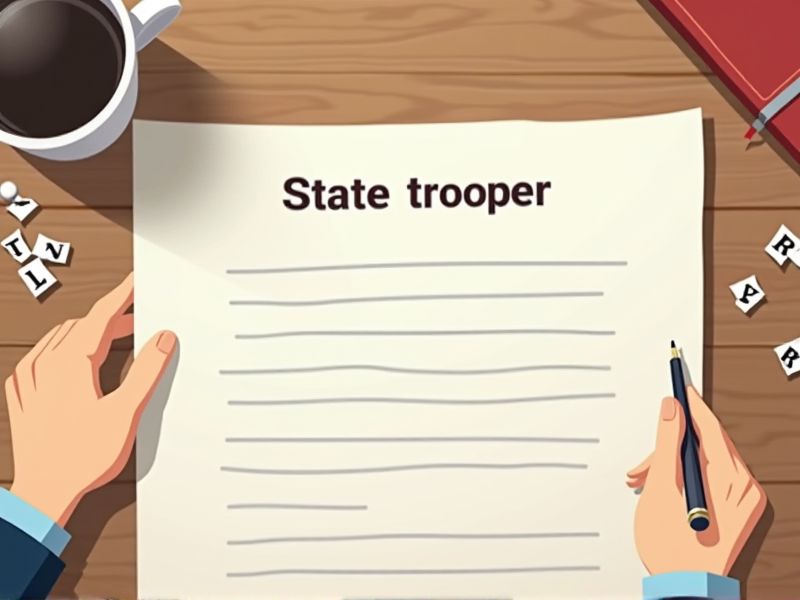
State troopers play a critical role in maintaining public safety, requiring a set of specialized skills to manage various unpredictable situations. Possessing certain certifications ensures they are equipped with the knowledge and proficiency necessary to perform their duties effectively. Certifications also demonstrate a commitment to ongoing professional development, essential in adapting to evolving laws and technologies. Important certifications for a State trooper include both technical and safety-focused credentials.
POST Basic Certification
The POST Basic Certification ensures state troopers meet standardized training requirements and enhances their ability to effectively enforce laws. This certification provides essential skills in legal, tactical, and crisis management areas, which are critical for public safety roles. Without meeting these standards, troopers may lack the necessary competencies to handle complex or high-risk situations. Consistent certification across states promotes uniformity in law enforcement procedures and practices.
POST Advanced Certification
State troopers often face complex and high-risk situations that require specialized skills and advanced decision-making, making POST Advanced Certification crucial. The certification ensures that officers are trained in the latest law enforcement techniques and practices tailored to specific regional needs. This level of preparation contributes to improved public safety and more effective crime prevention. Departments benefit from enhanced officer readiness, reducing liability and increasing public trust.
Firearms Proficiency Certification
Firearms Proficiency Certification ensures that state troopers are trained to handle weapons safely, reducing the likelihood of accidental discharges or injuries. Proper certification enhances a trooper's effectiveness in high-pressure situations by ensuring they can accurately and confidently use their firearms when necessary. This certification is critical in building public trust, demonstrating that troopers are prepared and have met rigorous standards of firearm competence. State troopers with such certification can better protect themselves and the public, contributing to overall community safety.
Defensive Tactics Certification
Defensive Tactics Certification enhances a state trooper's ability to manage physical confrontations effectively, leading to safer interactions. Proper training in such tactics reduces the risk of injury for both officers and civilians, promoting overall safety. Certification ensures troopers are up-to-date with best practices and legal standards, helping align their actions with current regulations. It instills a sense of confidence and readiness, essential for maintaining peace in unpredictable situations.
Emergency Vehicle Operator Course (EVOC) Certification
The EVOC certification equips state troopers with advanced driving skills necessary for navigating high-stress situations, reducing the likelihood of accidents. Proper training in vehicle dynamics and maneuvers ensures troopers can safely respond to emergency calls, enhancing public safety. State troopers with EVOC certification demonstrate higher proficiency in pursuit tactics, which is essential for law enforcement operations. Mandating EVOC certification helps maintain consistent standards across the force, ensuring all officers have a baseline competency in operating emergency vehicles.
CPR and First Aid Certification
State troopers frequently encounter emergency situations where immediate medical assistance is crucial. Having CPR and First Aid certification enables them to provide life-saving measures promptly. This training helps stabilize victims until professional medical help arrives, reducing mortality rates. Certification also aligns with the trooper's responsibility to ensure public safety and preparedness during crises.
Crisis Intervention Training Certification
Crisis Intervention Training (CIT) certification equips state troopers with skills to effectively handle situations involving individuals experiencing mental health crises. The training reduces the likelihood of violent confrontations and injuries during these encounters. State troopers can better identify mental health issues and apply de-escalation techniques that can prevent unnecessary arrests or use of force. CIT enhances collaboration between law enforcement and mental health professionals, improving overall community trust and safety.
Advanced Driving Techniques Certification
State troopers face challenging and unpredictable road conditions, necessitating advanced driving techniques to effectively respond to emergencies. Certification ensures troopers possess the skills to safely maneuver vehicles at high speeds or through complex traffic situations. Such training minimizes accident risk, protecting both the trooper and the public. Equipping troopers with advanced driving skills enhances overall enforcement of road safety laws.
Incident Command System (ICS) Certification
The Incident Command System (ICS) Certification equips state troopers with standardized procedures for managing emergencies, enhancing their ability to coordinate effectively with other agencies. This training leads to improved communication during critical incidents, reducing confusion and response time. Mastery of the ICS framework enables troopers to make informed decisions during complex operations, promoting safety and efficiency. Advanced understanding helps ensure resource allocation is optimized, leading to more successful incident resolution.
Communication and Radio Operations Certification
State troopers often face situations requiring clear and precise communication to coordinate effectively with other law enforcement units and emergency services, impacting their ability to maintain public safety. A Communication and Radio Operations Certification ensures that troopers are proficient in operating radio equipment essential for reliable transmission and reception of information. Effective use of radio communication directly affects response times and decision-making during critical incidents. Certification also provides troopers with standardized protocols that enhance interoperable communication with different agencies during large-scale emergencies.
Summary
When you encounter a State trooper with advanced certifications, you benefit from enhanced law enforcement skills. This trooper exhibits improved investigative abilities, resulting in more efficient handling of cases. The advanced training leads to increased public safety and trust in law enforcement. Consequently, their expertise contributes to lower crime rates and a safer community environment.
